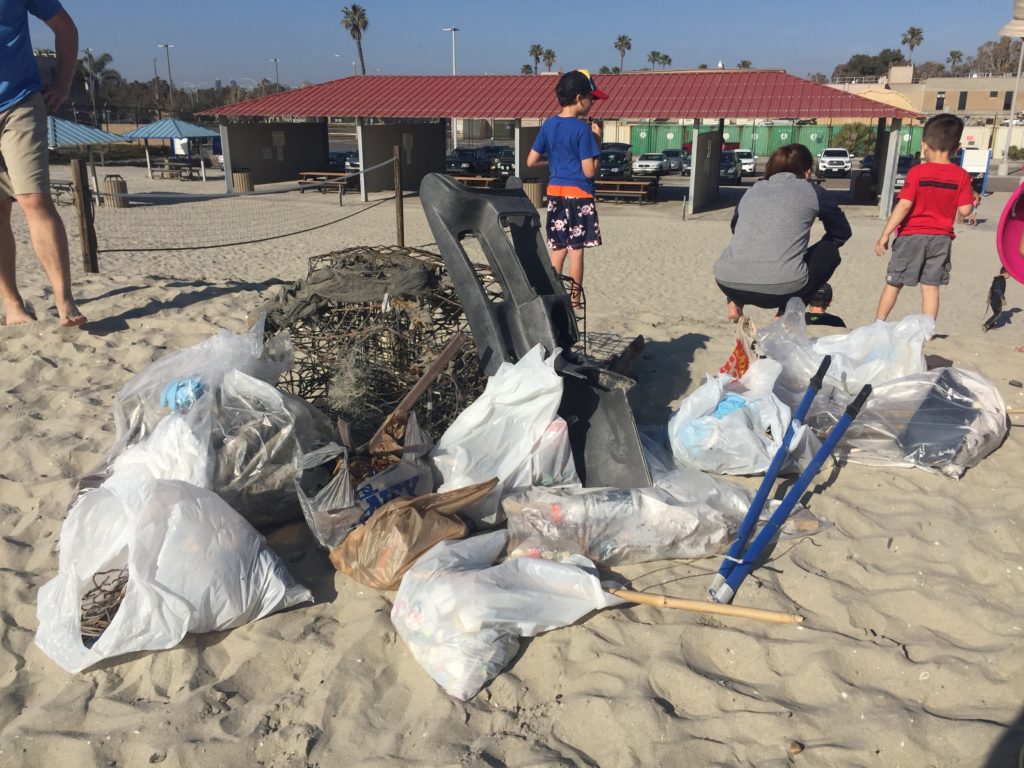“Unless someone like you cares a whole awful lot,
nothing is going to get better. It’s not.”
-Dr. Seuss , The Lorax
 A few weeks ago the Heames family, Jeff, Stephanie, and their sons Truman and Griffin, headed to Gator Beach, one of their favorite local hangouts. Known for its glittery sand and abundance of sand dollars, Gator Beach, located at Naval Amphibious Base Coronado, is right next to where the remains of the sunken gambling ship, the SS Monte Carlo, are entrenched.
A few weeks ago the Heames family, Jeff, Stephanie, and their sons Truman and Griffin, headed to Gator Beach, one of their favorite local hangouts. Known for its glittery sand and abundance of sand dollars, Gator Beach, located at Naval Amphibious Base Coronado, is right next to where the remains of the sunken gambling ship, the SS Monte Carlo, are entrenched.
What was supposed to be a relaxing afternoon at the beach quickly turned into a bit of a disappointment. Everywhere the Heames family looked, there was litter scattered. Rather than building sand castles, Truman, age 8, and Griffin, age 6, started bringing their parents “treasures” they found, including lobster/crab traps, large pieces of styrofoam, medical waste, and discarded bottles of pills. “I really think a lot of it washed up or drifted to Gator Beach as opposed to people leaving litter behind on Gator Beach. Every time I go there, I always see everyone being very respectful of the beach,” Stephanie says. “The only thing most people accidentally leave behind at Gator Beach are their sunglasses. We found at least six pairs that day,” she adds.

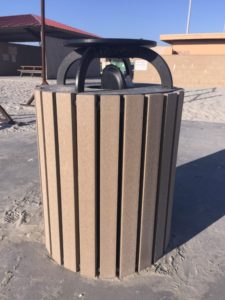
Realizing that everything the boys found couldn’t possibly fit in the trashcans provided at the beach, Stephanie told them, “I don’t know where we can put these things. We can’t take them with us.” Noting the boys’ disappointment, she understood that she was diminishing their enthusiasm for cleaning up the beach. While her sons were joyfully picking up trash, Stephanie, concerned about what they were touching, kept telling them to drop it. She recalls, “They found a pair of underwear in the sand, and I screamed, ‘Don’t touch it! Don’t touch it!’ Then Griff showed me a tube, and I saw that it was for medical specimens, and said, ‘Eww! Put it down!’ I kept saying that over and over, and I thought, ‘I don’t want to be that mom.’ I want them to enjoy the beach, and enjoy getting dirty. They care about the environment, and I felt badly that I was discouraging them from picking up trash.”

Determined not to send the boys the wrong message, Stephanie and Jeff promised them, “Next time we come back, we’ll bring trash bags with us so we can all clean up the beach together, and we’ll invite our friends to help too!”
Unsure of the protocol for removing anything from the military beach, even litter, Stephanie contacted the Command Master Chief of Naval Base Coronado, CMDCM (SW/AW) Matthew Logsdon, about organizing a beach cleanup at Gator Beach. “I didn’t know if there was anything on the beach that had intrinsic value that shouldn’t be picked up or removed,” she said. Stephanie asked what should be done with full trash bags, unsure whether it was permissible to use the dumpsters in the parking lot or haul the bags of trash off base. She explained to Logsdon that she didn’t want to fill up all the trashcans in the recreation area by the picnic tables and showers because she wanted beach guests to still have a place to dispose of their rubbish.
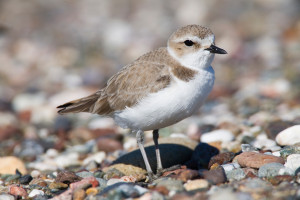
CMDCM Logsdon gave Stephanie permission to organize an official beach cleanup at Gator Beach, setting the boundaries for where trash pick up was allowed as well as permission to discard filled trash bags in the dumpster. Logsdon also informed Stephanie that there was a scrap metal dumpster that was to be used for any bits of metal found. He then referred her to Tiffany Shepherd, Wildlife Biologist, Naval Base Coronado because he knew it was nesting season for the Western Snowy Plovers.
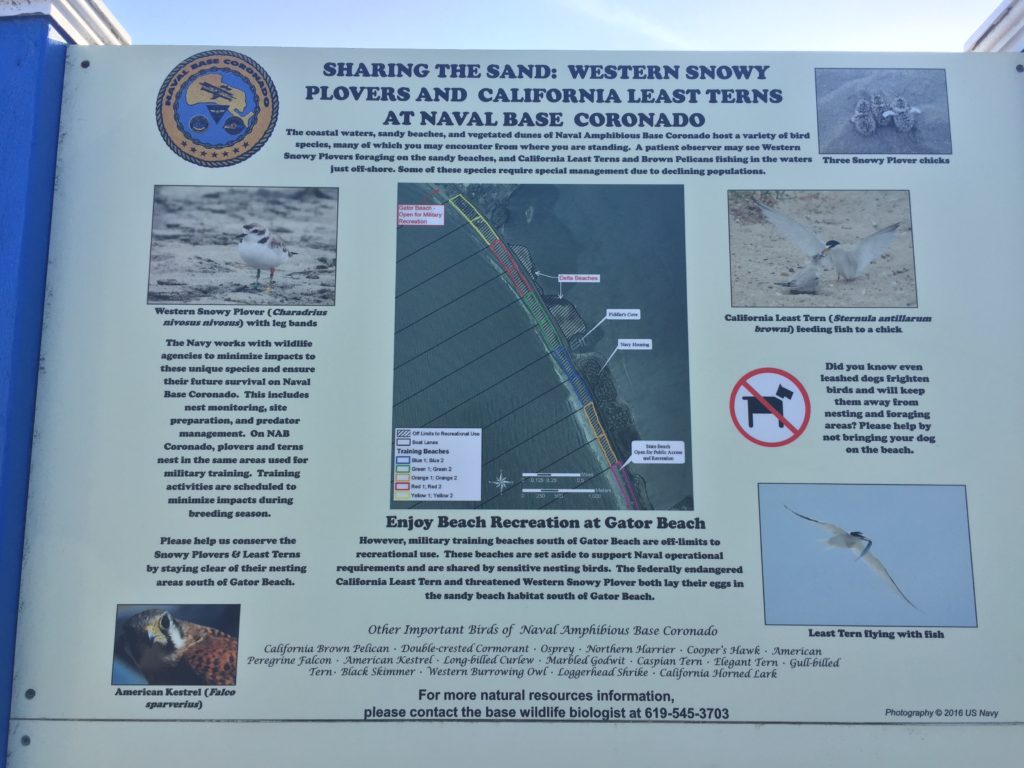
Shepherd applauded Stephanie’s initiative, and gave the go ahead for the beach cleanup since plovers do not nest on Gator Beach. She reiterated the parameters of the cleanup area to ensure that the Heames family and their friends did not venture south into nesting areas. Shepherd said it would be okay to go as far south as the last buildings on NAB, where the obstacle course starts, without impacting any nesting birds. Additionally she reminded Stephanie that none of the volunteers would be allowed to pick up bullet casings or spent ammunition.
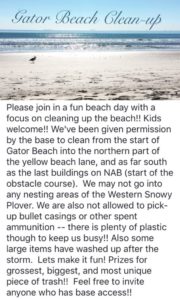
With permission granted, Stephanie then sent an invitation to friends on Facebook so that others could join her family in the cleanup fun. Modeling the beach cleanup in the fashion of an Easter egg hunt, Stephanie thought of prizes that could be awarded to make picking up litter into a competition of sorts.
At 2:00pm on Saturday, March 11, 2017, the Heames family and their friends met at Gator Beach. Stephanie went over the rules for the cleanup, mainly instructing everyone about where they were allowed to go and reminding them about the rules of staying clear of spent ammunition. As everyone put on the gloves Stephanie provided, she told them prizes would be awarded, and told the helpers that her husband, known as Mr. Heames to the kids, would be the official judge.

The kids, bursting with excitement, grabbed trash bags from Stephanie, and made a mad dash to collect litter. Who would have ever thought that picking up trash could be so much fun? Even though it was technically a contest, the kids decided on their own to work together in teams, making their scavenger hunt even more entertaining! Nothing like teamwork!

For roughly two hours, kids and adults roamed the beach, finding all sorts of debris. Discarded cigarette butts and lighters, plastic water bottles, straws, empty beer cans, balloon remnants with ribbons, food wrappers, pieces of treated wood, fishing nets, and more were collected. It was eye opening seeing how many plastic bottle caps were found as well as how many unidentifiable pieces of plastic were scattered seemingly everywhere. As one child had a hard time determining whether something she found was litter, an adult advised her, “If it didn’t come out of the ocean naturally, it doesn’t belong on our beach.”

Truman and Griffin were thrilled when they found a large tire embedded in the wet sand, and with help from their dad, they used their hands to dig it out together, certainly no easy feat. They proudly rolled the tire back to “headquarters”, the area where everyone started. Their father Jeff shared, “I think it’s great to see young kids doing their part to clean up our environment, making it a safe and healthy place to live.”

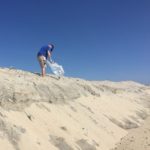
Meanwhile others continued to fill their bags with a variety of trash, including sharp barbed wire and scraps of metal that could easily injure anyone walking barefoot on the beach. Some of the volunteers walked along the shoreline while others climbed up on the berm separating the beach and the recreation area, where there are picnic tables, grills, and a volleyball court. Unfortunately there was no shortage of trash to be found.
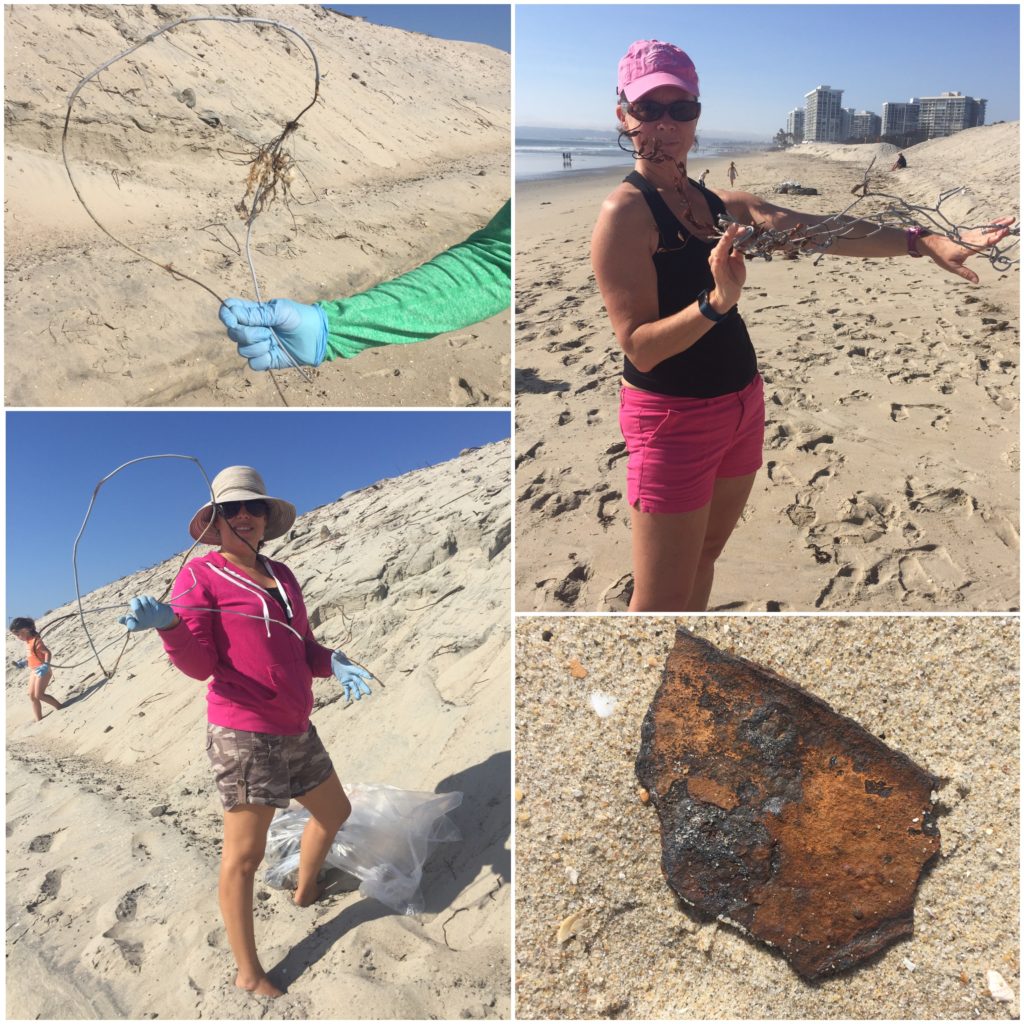
Many of the parents who attended the Gator Beach cleanup did so as a learning opportunity for their children. Kris and Pete Collins brought their three daughters, Katie, Madie, and Lily, with them. Kris said, “I think it’s teaching the kids a good lesson about how to respect the ocean as well as the beach because the two go hand in hand. It’s fun for the kids to come out and see all this garbage, making them aware that if they don’t clean up after themselves, this [pointing to the bag of trash in her hand] is the consequence. We all share the coast, and need to protect it together.” Pete said, “There’s a lot of trash out here! I know a lot of it comes from getting washed up on the beach, but I’m very surprised at how much of it is deteriorated forms of plastic.”
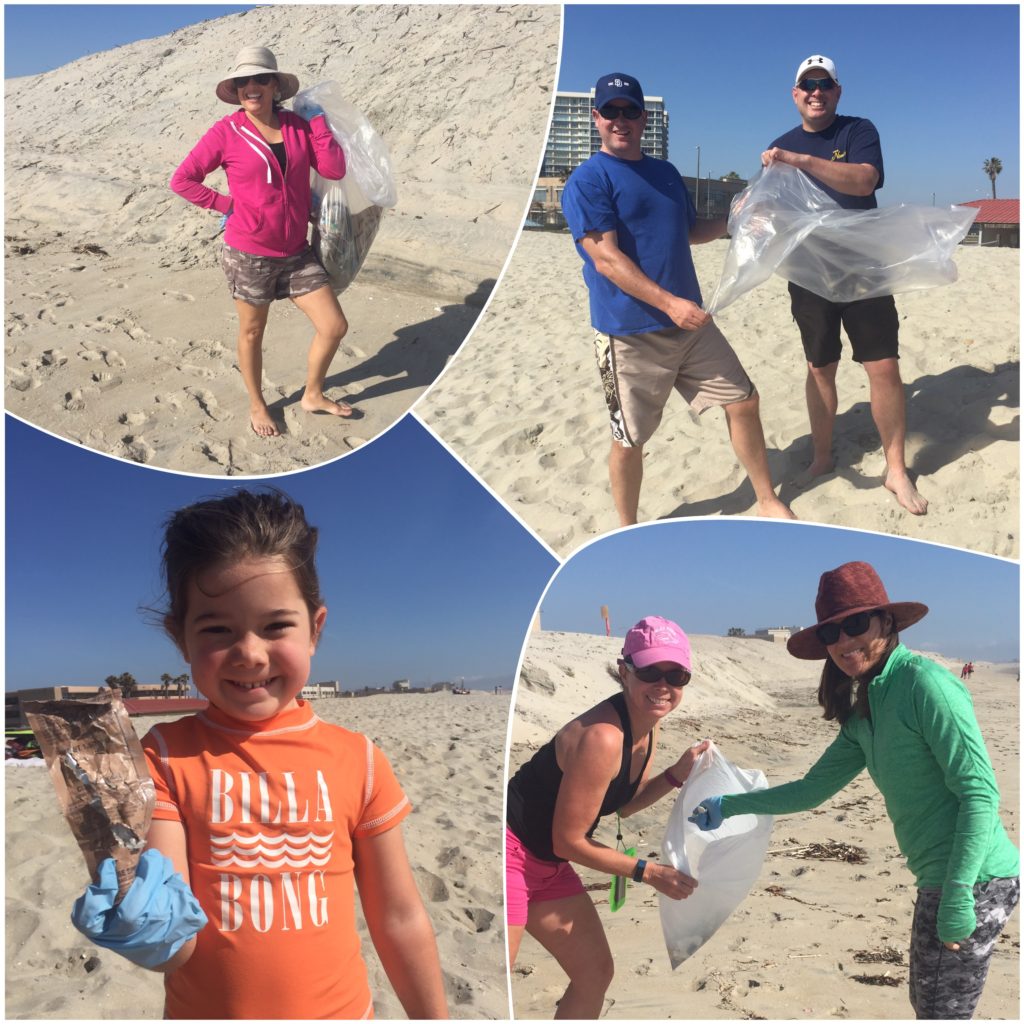
Theresa Jones, a mother of two sons, shared, “I brought the kids here to help cleanup, contribute, and see that they don’t necessarily need to be a part of anything big or official to make a difference. They can just come with friends, and do something good. Every little bit helps!” Her oldest son Anthony, who’s in fourth grade, said, “I think there’s way too much trash on this beach considering it’s so beautiful. People obviously need to start being responsible for their own litter.” Even Theresa’s three year old son Hunter put on gloves, and was all smiles as he plucked pieces of trash out of the golden sand.

Jen Whalen of Point Loma saw on Facebook that Theresa had marked that she was attending the beach cleanup, and asked Theresa if she and her family could join the cleanup. She said, “We come down to the beach all the time so it’s fun to clean up while we’re here too.” Jen has long been passionate about the environment, and shared that she’s a proud supporter of 5 Gyres, an organization that “empowers action against the global health crisis of plastic pollution through science, art, education, and adventure.” Jen picked up a handful of sand, and showed all of the small bits of plastic in it, explaining, “The microplastics that end up on our beaches are a direct result of products people use like shampoos, body washes, and face washes that have microbeads in them that then end up in the water as they get washed down drains. Animals are eating them, and fish that are in the ocean are as well, which means that these microbeads then end up back in our bodies as we consume food.”

Amanda Hulin brought her daughters Mariah and Ada to the beach cleanup. After the recent Tijuana River sewage spill, she felt this was the least she and her family could do to stave off the spill’s effects here in Coronado. “This is an invaluable life lesson for the kids to see firsthand what happens when people litter. The next time we come to the beach, I have absolutely no doubts that the kids will be meticulous about cleaning up after themselves.” Amanda was surprised that she too actually had fun cleaning up as she walked the beach with her friends. “It’s really not much different than taking a stroll on the beach; I just happen to be picking up trash as I catch up with my friends.”
As everyone returned to headquarters, they began to look into their trash bags, noting with pride what they had collected. It was reminiscent of analyzing the loot after going out trick-or-treating except the contents of these bags were stinky rather than sweet.

Before the judging began, Stephanie reminded the children, “Even if you don’t win a prize, you should have a good feeling in your heart that you helped the birds, the fish, the dolphins, and the people in our community.” Everyone agreed wholeheartedly. The kids showed their finds to Judge Heames, who, after carefully rummaging through their bags, announced the winners. As prizes, Stephanie chose chocolate birds, tying in the idea that cleaning up trash directly helps the birds and sea life. Because the kids chose to work in teams, each group shared their prize, savoring the treat after working hard together; they even shared with the kids who didn’t technically win a prize, making everyone feel good.
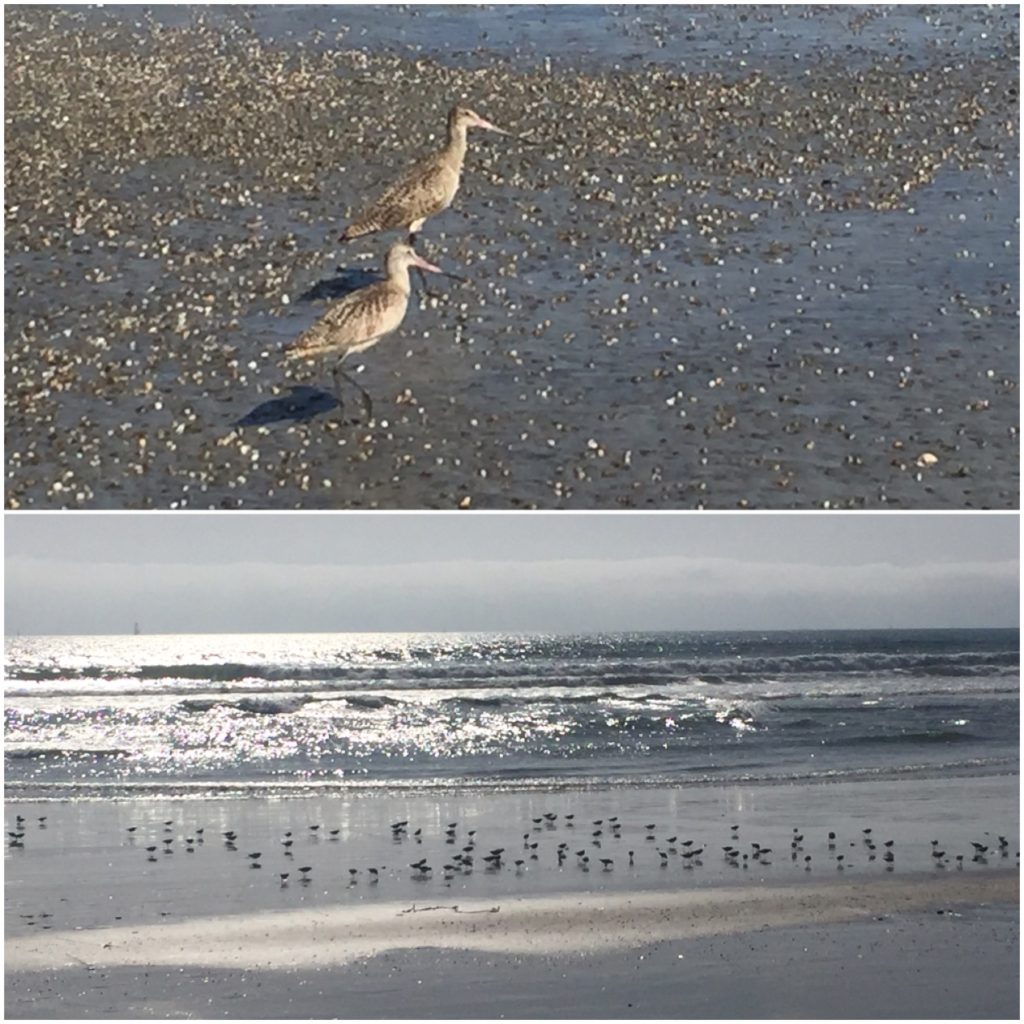
Biggest Piece of Trash Award

The Biggest Piece of Trash Award went to second graders Madie Collins and Ada Hulin for their lobster/crab trap. They had to dig it out of the sand, and it was so large that they needed one of the adults to help haul it. Second grader Madie said, “I’m very happy that we found so much trash because it helps our community and our world.”
Most Interesting Trash Award

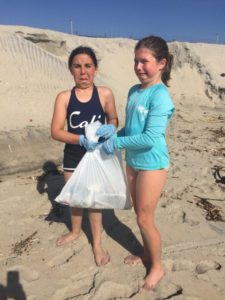
Fourth graders Mariah Hulin, Katie Collins, and Addison Cornelius found what appeared to be a dashboard, earning them the prize for Most Interesting Trash Award. Mariah commented, “Even though I was doing something really gross, it was fun because I got to be with my friends. I would definitely do this again!” Katie reflected, “I thought this was a great idea for a group activity, and it was cool because all of us worked together to clean up the beach.” Even though overall the girls all said they had fun, they admitted some of the beach cleanup was downright unpleasant due to the foul odor emitted by some of the refuse as well as the tiny flies that hovered around it.
Most Trash Award
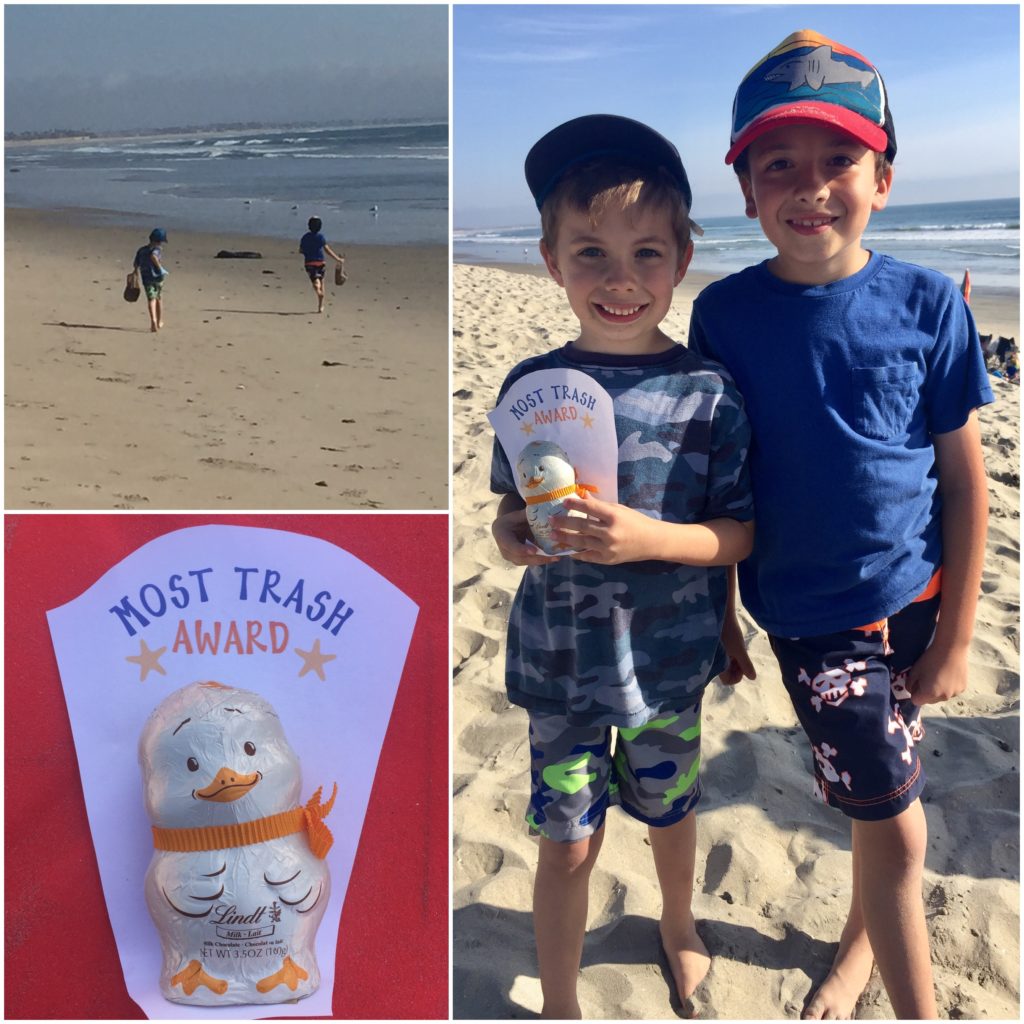
In addition to the large tire they found, the Heames brothers filled a couple of bags with trash, earning them the Most Trash Award. Truman commented, “I feel good because I really like animals, and I don’t want any more to become extinct.” He worries that people who litter don’t care about animals the way he does, and says he feels “disappointed” when he sees so much trash.
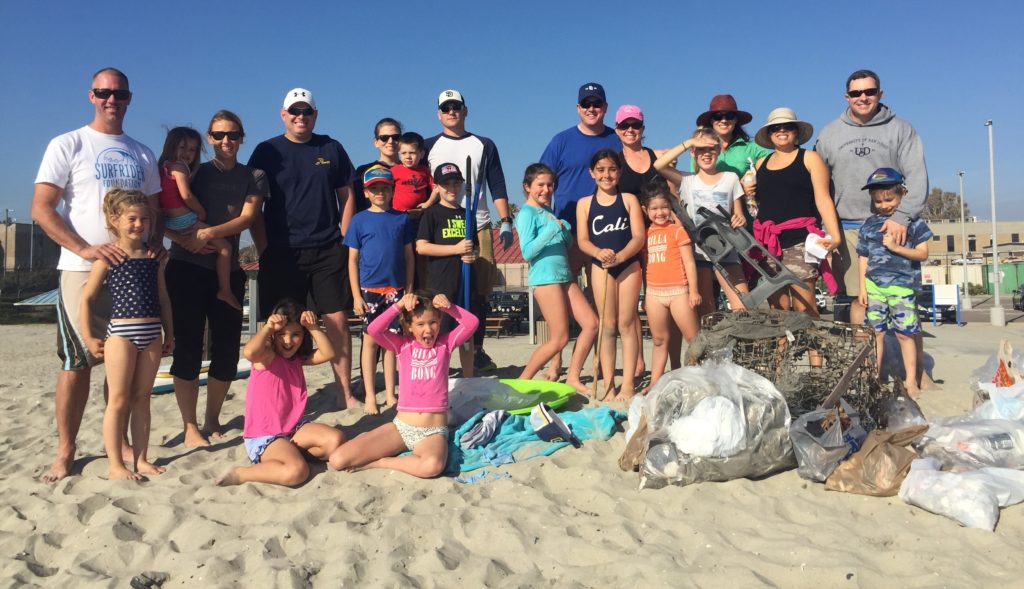
While the Gator Beach cleanup certainly didn’t rid the beach of all the trash, it helped these military families feel like they were giving back to the place they currently call home. This is the second time the Heames family has lived in Coronado, and even though Jeff’s next assignment might take them elsewhere, the Crown City will always remain one of the family’s favorite places. “I’m hoping the kids learned that they can do something. Sometimes you can’t do it immediately, like that day when we didn’t have trash bags with us, but that doesn’t mean you can’t go back and pick up trash another time,” Stephanie shares.
Stephanie concludes, “I know there are lots of other people in Coronado who have organized beach cleanups on our local beaches, which I think is wonderful. They inspire me! I know that not everyone involved in those other beach cleanups have base access so we were just doing our part to help try to keep Coronado’s beaches clean too. This is our family’s way of giving back, and I know this definitely won’t be our last beach cleanup.”
